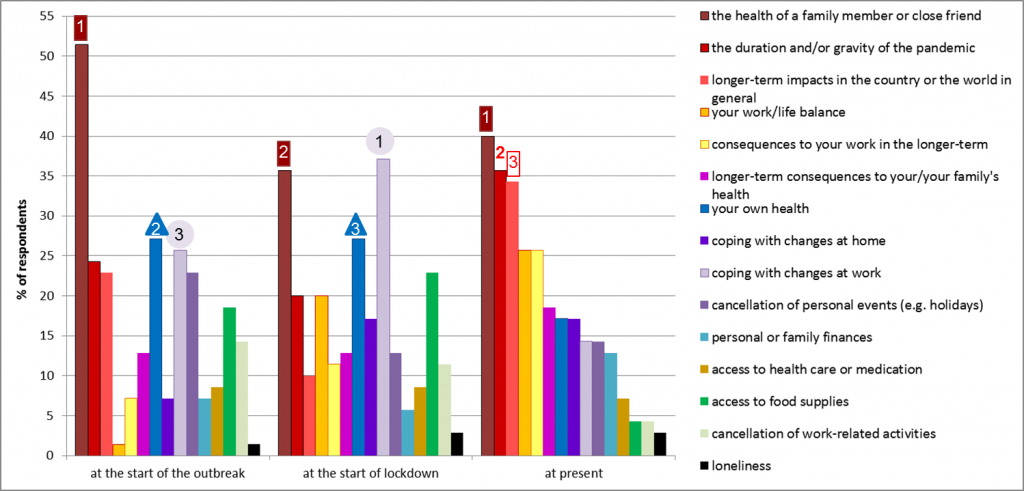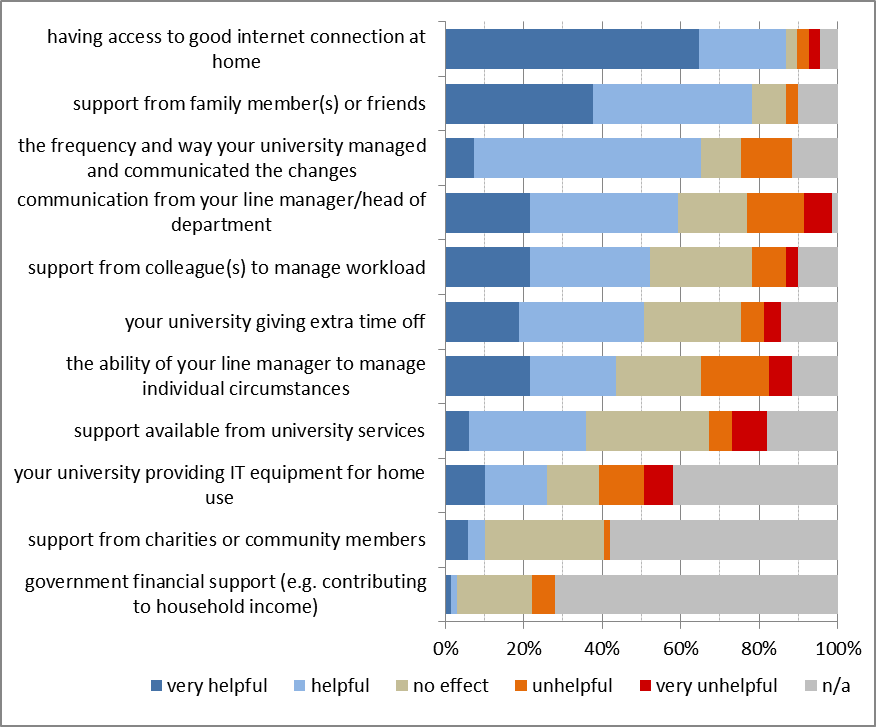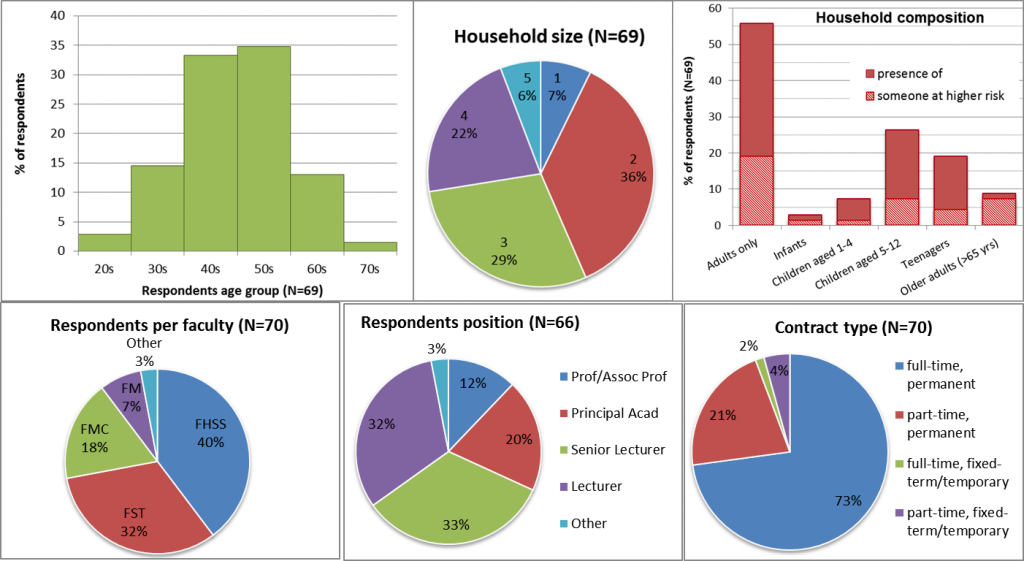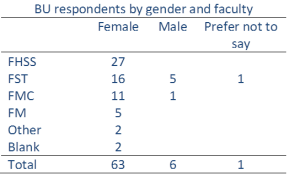In our previous blogs, we showed that work-life balance during lockdown got worse for 59% and improved for 37% of the 70 BU academics who responded to our survey (blog Part 1). We also showed how some aspects of life in lockdown have affected groups of people differently. For example, a considerably higher proportion of respondents under 40 years of age reported negative effect from switching to online teaching (75%), change in the number of emails (58%) and changes in the number of meetings (50%) in relation to other age groups (blog Part 2). This blog Part 3 focuses on how the main concerns of academics shifted through time and the support they have found most helpful.
If you have not yet contributed to this survey, you are kindly invited to do so here: https://bournemouth.onlinesurveys.ac.uk/impact-of-lockdown-on-academics, and please do share with your networks. If you want us to be able to identify that you are BU staff, you will need to provide this information in one of the open questions.
We asked respondents to identify the three main concerns they had at the start of the outbreak, at the start of the lockdown and at present from a list of 15 options. While respondents’ main concerns have changed through time, the health of a family member or close friend have always remained within the top three (Figure 1). Own health and coping with changes at work were within the top three main concerns at the start of both the outbreak and lockdown but subsided in priority afterwards. As lockdown progressed, main concerns shifted to broader issues such as the duration and/or gravity of the pandemic and longer-term impacts in the country or the world in general. It is important to note that, from the start of the outbreak to the time they responded to the survey (end of April/early May), work-life balance and the consequences to own work in the longer-term became a major concern to a considerably larger proportion of respondents.

Figure 1. Respondents’ main concerns at the start of the outbreak, at the start of the lockdown and at present.
In open comments, respondents identified other aspects that are of major concern, which can be grouped as worries about own or others health, managing circumstances at home or at work (Table 1).
Table 1. Other major concerns expressed by respondents

Figure 2 highlights the types of support that were considered to be helpful and the ones that need to be improved to help a larger number of staff (e.g. provision of IT equipment, which BU is currently addressing and support from line managers). Unsurprisingly, having good internet connection at home was considered very helpful by 65% of respondents and the support from family and colleagues was considered extremely valuable at these critical times .

Figure 2. Respondents indication of how helpful were these particular types of support available to them.
Responses to open questions provided insights on the relevance of support received and identified other means of support not listed in Figure 2. These other means of support are summarised in Table 2.
The support offered by learning technologists and other colleagues to enable the quick turnaround to online teaching was considered invaluable. In terms of support provided by the university, the extra days of leave were mentioned most often. Respondents indicate that they appreciate the ‘gesture of goodwill’ but are concerned that they might not be able to take these days in the near future due to work pressures. It was also mentioned that these extra days do not cover for the costs of working from home, e.g. internet charges.
Table 2. Examples of other types of support and coping strategies respondents found useful during lockdown.

Respondents identified four aspects in which support from the university could be more effective:
- Availability of equipment and workspace adequate for job – this included computer/laptop, desk/chair, internet and quiet space at home.
- Better communication and/or more timely guidance from the university to help staff dealing with student queries – issues of concern included the cascading of communication, with staff sometimes learning information from students and poor/insufficient information and support to staff, particularly affecting programme leaders, the first port of call to student cohorts.
- Need for management to plan ahead more efficiently
- Support and guidance to staff undertaking PhDs
Who are the respondents?


Exposure to Covid-19
- 7% of respondents (5 out of 68) had severe symptoms of Covid-19 or tested positive or live with someone who did. All are female respondents in their 20s, 30s and 50s. Two of these households had someone at higher risk for severe illness from COVID-19.
- 22% of respondents (15 out of 68) had close family members, friends or colleagues who had severe symptoms of Covid-19 or tested positive. All are female respondents in their 30s, 40s and 50s (the majority, 9 respondents).
- 41% of respondents (28 out of 68) live in a household where there is at least one person at higher risk for severe illness from COVID-19.











 Nursing Research REF Impact in Nepal
Nursing Research REF Impact in Nepal Fourth INRC Symposium: From Clinical Applications to Neuro-Inspired Computation
Fourth INRC Symposium: From Clinical Applications to Neuro-Inspired Computation ESRC Festival of Social Science 2025 – Reflecting back and looking ahead to 2026
ESRC Festival of Social Science 2025 – Reflecting back and looking ahead to 2026 3C Event: Research Culture, Community & Cookies – Tuesday 13 January 10-11am
3C Event: Research Culture, Community & Cookies – Tuesday 13 January 10-11am Dr. Chloe Casey on Sky News
Dr. Chloe Casey on Sky News ECR Funding Open Call: Research Culture & Community Grant – Application Deadline Friday 12 December
ECR Funding Open Call: Research Culture & Community Grant – Application Deadline Friday 12 December MSCA Postdoctoral Fellowships 2025 Call
MSCA Postdoctoral Fellowships 2025 Call ERC Advanced Grant 2025 Webinar
ERC Advanced Grant 2025 Webinar Horizon Europe Work Programme 2025 Published
Horizon Europe Work Programme 2025 Published Update on UKRO services
Update on UKRO services European research project exploring use of ‘virtual twins’ to better manage metabolic associated fatty liver disease
European research project exploring use of ‘virtual twins’ to better manage metabolic associated fatty liver disease
Thank you Lu. Impressive piece of work.